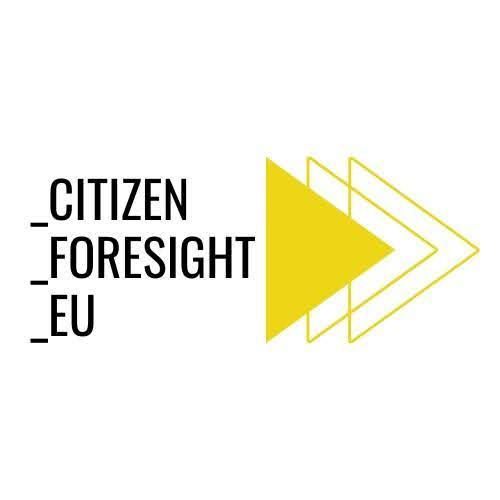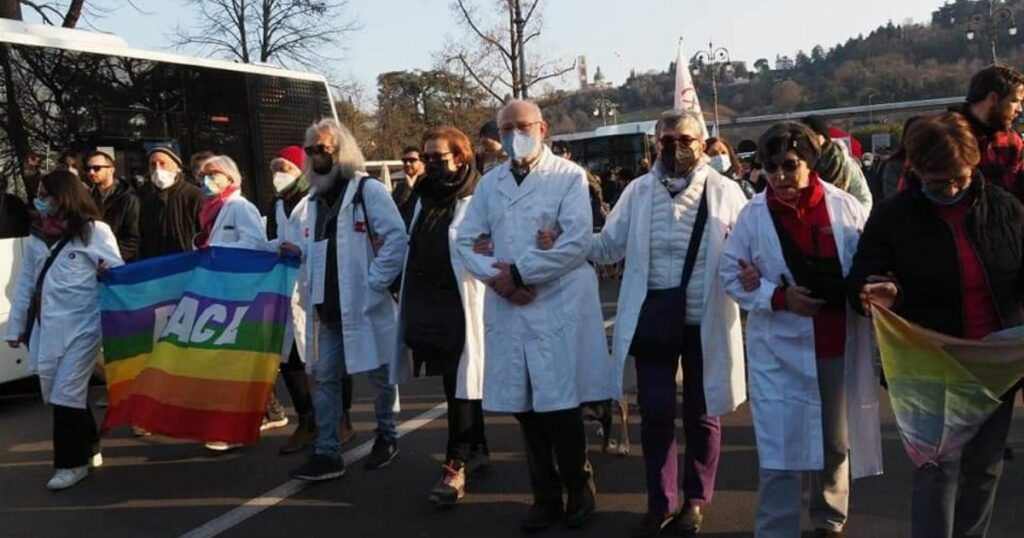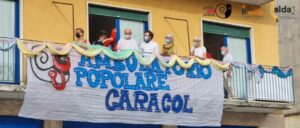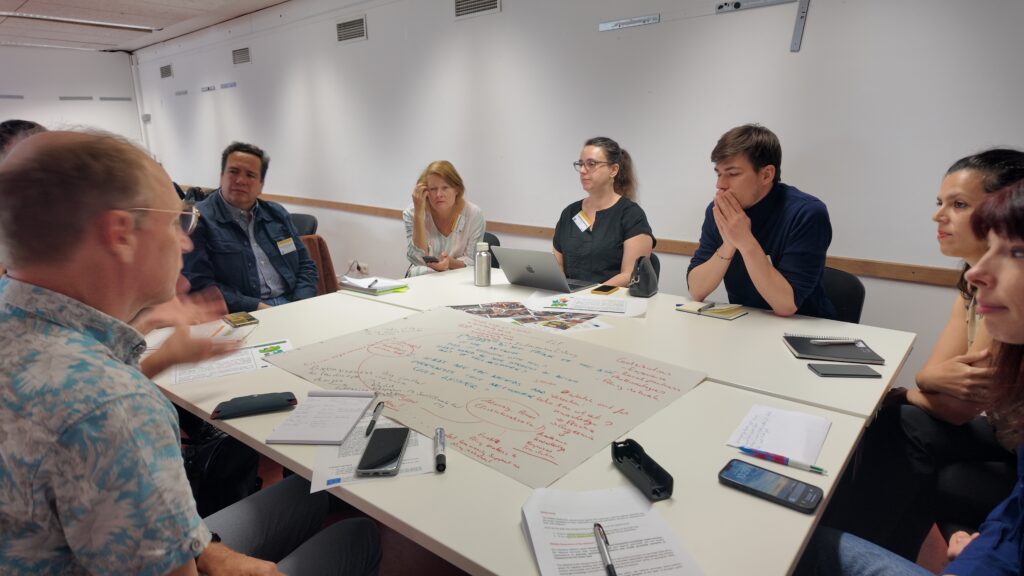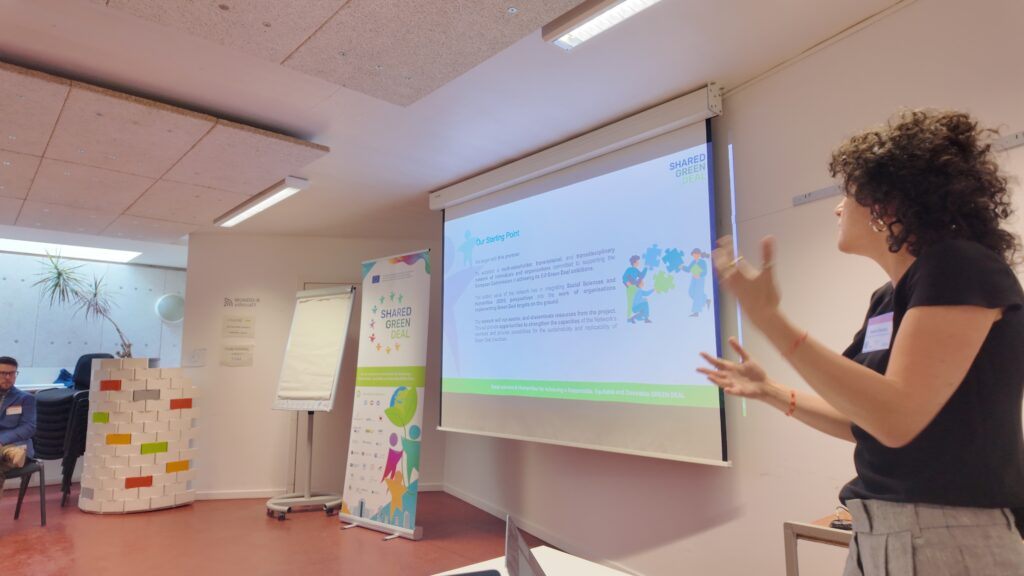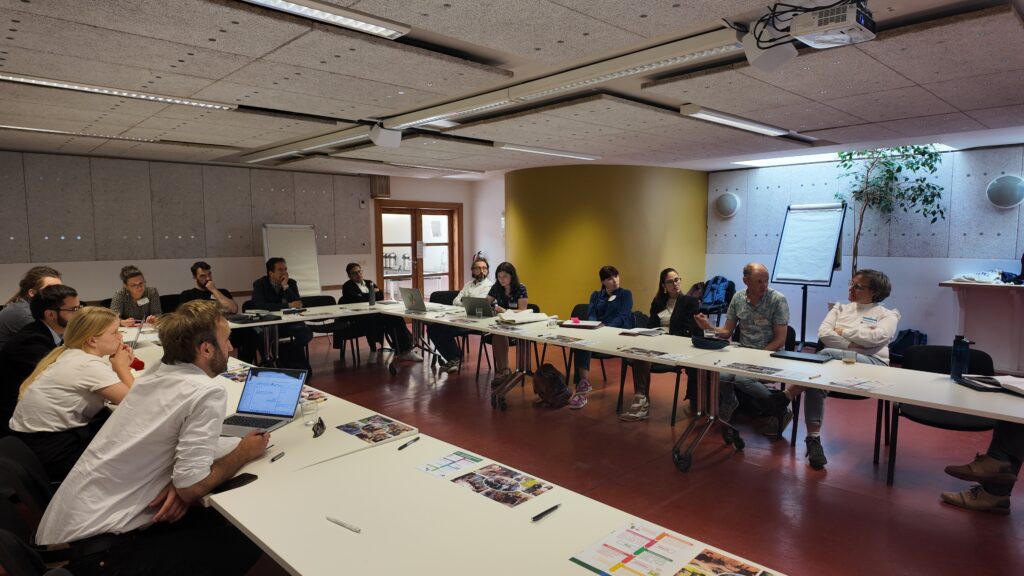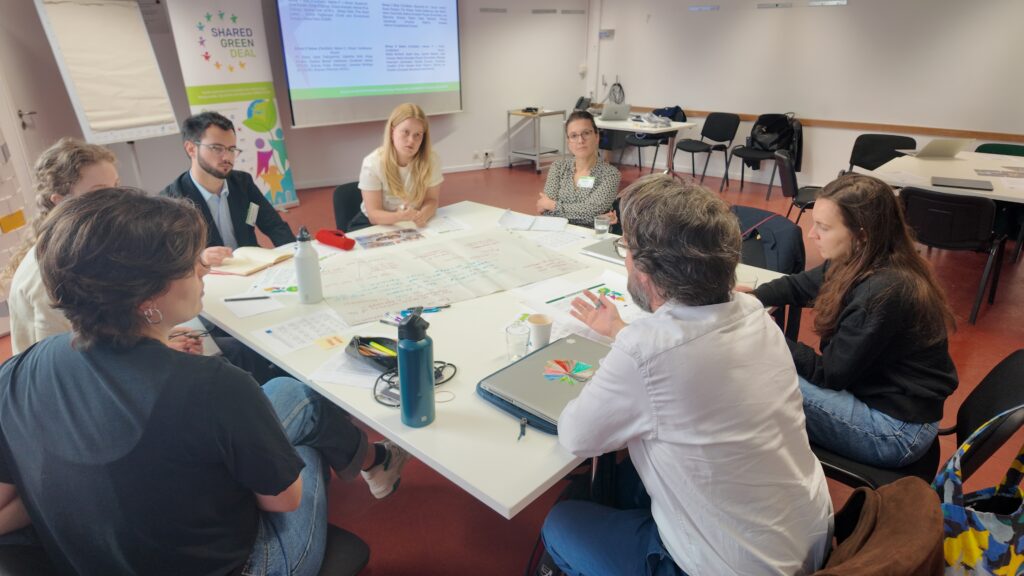Роздуми після модерації панелі “Об’єднані громади та регіони: Ефективне управління для відновлення України” на Конференції з відновлення України 2025 у Римі, Італія.
This article is in Ukrainian 🇺🇦, for the English 🇬🇧version click here.
Антонелла Вальморбіда, генеральний секретар Європейської асоціації місцевої демократії ALDA, модерувала панель з питань місцевого та регіонального врядування в Україні на Конференції з відновлення України, що відбулася в Римі 10-11 липня 2025 року.
Нижче наведено розповідь про цей досвід з перших вуст пані Вальморбіди. Пані Вальморбіда відіграла важливу роль не лише під час самої Конференції, а й протягом усього процесу підготовки до цього вирішального моменту URC 2025.
АЛДА твердо підтримує Україну в її боротьбі проти російської агресії та на захист своєї територіальної цілісності. З 2012 року ALDA бере активну участь у зміцненні місцевої демократії та послідовно підтримує європейські прагнення країни та її громадян.
“На URC 2025 у Римі я мала честь модерувати панель, присвячену місцевому та регіональному управлінню в Україні.
Я розпочала сесію з короткої, але впливової заяви, яка одразу ж привернула увагу до суті питання:
“Відновлення України не може бути успішним без міцного демократичного та підзвітного врядування на всіх рівнях. І навіть у найдраматичніші моменти війни ми бачили, що українські громади, мери і місцеві лідери не лише вистояли, але й повели інших за собою”.
Це не були абстрактні дебати. Це була розмова про реальних людей, які під реальним тиском щодня приймають критичні рішення. Під час сесії стало зрозуміло, що місцеве самоврядування стало основою стійкості та відновлення України. Саме на місцевому рівні відбудова вже почалася – через підземні лікарні, системи енергозахисту, міжмуніципальне співробітництво та безпечні притулки для навчання. Це не теорія, а щоденна реальність.
Панельна дискусія об’єднала потужний і різноманітний спектр голосів: мерів, регіональних лідерів, депутатів, міжнародних партнерів, експертів з питань реформ та посадовців ЄС. Але найголовніше, вона об’єднала справжні голоси – тих, хто живе і формує ці реалії на місцях.
Я хотіла би поділитися кількома основними моментами та цитатами, які відображають нагальність, чіткість та дух, що сформували дискусію.
У своїй проникливій промові Олексій Рябикін, заступник міністра розвитку громад та територій України, висвітлив надзвичайні виклики, з якими зіткнулася Україна через повномасштабну війну Росії, підкресливши, що жодна частина країни не є по-справжньому захищеною від ракетних обстрілів та атак безпілотників. Незважаючи на це, 99% органів місцевого самоврядування залишаються активними, відіграючи вирішальну роль у захисті своїх громад та підтримці демократичних цінностей.
Пан Рябикін наголосив на важливості створення правової бази для моніторингу рішень органів місцевого самоврядування, забезпечення чіткого розподілу повноважень та підтримання конструктивного діалогу між місцевою та центральною владою – навіть перед обличчям щоденних викликів.
“Україна продовжує реформи та відновлення. Чому? Тому що у нас немає іншого вибору. Реформи та відновлення – це про людей. Реформа триває щомиті. Місцеве самоврядування та центральна влада повинні мати можливість реагувати на ці виклики та зміни, і якби не внутрішня єдність, ми б не змогли відповісти на ці виклики“.
На завершення він висловив глибоку вдячність українським інституціям та міжнародним партнерам, яких він назвав “друзями”, за їхню непохитну підтримку, яка допомагає Україні розвиватися, захищати себе та проводити демократичні реформи.
Олександр Прокудін, голова Херсонської обласної адміністрації, описав прифронтові реалії області, яка стала символом як руйнування, так і стійкості:
“З серпня 2024 року почастішали атаки безпілотників. Щотижня ми стикалися з близько 3 000 ударів безпілотників. Але життя в Херсоні ніколи не зупинялося. Ми не здавалися. Ми не виїхали. Ми адаптувалися, чинили опір і вчилися”.
Дійсно, незважаючи на всі жахи, життя в Херсоні ніколи не зупинялося. Мешканці залишалися, адаптувалися, чинили опір та впроваджували інновації. Пан Прокудін розповів, як ці важкі уроки трансформувалися у програму “Військово-цивільні адміністрації в умовах сучасної війни” – практичний, заснований на досвіді посібник з виживання та функціонування в умовах постійних обстрілів. Програма охоплює такі теми
● Захист від безпілотників, включаючи трирівневу електронну стіну, що працює на 15 частотах, і безпілотники, які перехоплюють інші в повітрі.
● Медична допомога в умовах обстрілів: підземні шпиталі вже функціонують і будуються нові.
● Освіта: діти навчаються у притулках і планується відкриття нових шкіл під захистом.
● Енергетична стійкість, коли критична інфраструктура захищена засобами фізичного захисту, радіоелектронної боротьби та резервними системами електропостачання.
Спікер попередив, що якщо війна досягне інших частин Європи, непідготовлені регіони зіткнуться з катастрофічними наслідками. Досвід Херсона, набутий через руйнівні втрати, тепер може послужити іншим.На завершення він зробив потужний заклик: надати сенс стражданням Херсона, трансформувавши біль у готовність, і “побудувати Європу, в якій жоден регіон не буде вивчати ці уроки важким шляхом“..
Віталій Безгін, голова Комітету з питань державного будівництва Верховної Ради України, пов’язав поточні виклики з більш широкою картиною: він подякував європейським партнерам, зокрема італійським, за їхню постійну підтримку, підкресливши, що Україна захищає не лише себе, але й усю Європу від російського самодержавства.
Потім він розповів про унікальний досвід України: понад 11 років війни та реформи децентралізації, 5 років нового територіального устрою та 3 роки повномасштабного вторгнення. Незважаючи на це, українські муніципалітети та обласні адміністрації розробили “симбіотичну” модель, яка балансує між децентралізованим управлінням та державним управлінням – структуру, яка допомогла зберегти стабільність під час війни.
“Ми отримали цю симбіотичну систему децентралізованих муніципалітетів і громад, але паралельно ми отримали наші державні адміністрації”.
Він також виділив три ключові стовпи децентралізації в майбутньому: ресурси, вплив і, перш за все, відповідальність – особливо з точки зору прозорості та підзвітності перед громадянами.
Насамкінець, пан Безгін згадав територіальну реформу України 2019 року як унікальне досягнення: об’єднання понад 11 000 місцевих одиниць у 1470 сильних муніципалітетів. Ці громади тепер слугують не лише основою стійкості України, але й переднім краєм оборони Європи. “Україна, – підсумував він, – не лише потребує підтримки, але й готова поділитися з Європою своїми знаннями, здобутими важкою працею“.
Стефано Ло Руссо, мер Турина (Італія), виступаючи також від імені інших італійських мерів з таких міст, як Бергамо, Барі та Верона, провів паралель між викликами, з якими стикається Україна, та викликами, з якими стикається Італія, наголосивши на важливості перетворення трагедії на можливість для оновлення та зростання.
Відзначаючи давні традиції сильних муніципалітетів Італії, мер підкреслив центральну роль місцевої влади як в інституційному управлінні, так і в наданні державних послуг.
“Муніципалітети відіграють вирішальну роль не лише в адміністративних процесах, але й на інституційному рівні. Тому я вважаю, що в рамках європейського правового поля субсидіарність є центральною темою, і я вірю, що допомога Україні в реформуванні цього активу є фундаментальним кроком до створення нової моделі з розподілом між централізованою та децентралізованою владою”.
Він запропонував італійську модель – не як єдину, але як корисний орієнтир – для реформи децентралізації в Україні, виступаючи за чіткий розподіл обов’язків між центральною та місцевою владою. Насамкінець він підтвердив важливість субсидіарності та використання коштів ЄС на місцевому рівні, закликавши визнати місцеву автономію наріжним каменем майбутньої європейської інтеграції України.
Матьє Морі, Генеральний секретар Конгресу місцевих і регіональних влад Ради Європи, підтвердив давню прихильність організації до підтримки демократичної стійкості України – особливо на місцевому та регіональному рівнях.
“Україна є членом Ради Європи вже 30 років. Тож ми разом працюємо над зміцненням демократичної безпеки України, що, звичайно, передбачає також посилення децентралізації та належного врядування“.
Нагадавши про участь Конгресу в 2014 році під час першої хвилі реформи децентралізації, він підкреслив, що сьогодні Конгрес тісно співпрацює з українськими зацікавленими сторонами, в тому числі з Парламентом, урядом та асоціаціями органів місцевого самоврядування, щоб переглянути та оновити децентралізаційну програму 2014 року.
Відповідаючи на запитання щодо структури управління, Морі окреслив три основні напрямки:
- Перехід від військової до цивільної адміністрації на деокупованих територіях.
- Чіткий розподіл повноважень між національними та місцевими органами влади.
- Посилення міжмуніципального співробітництва, громадянської активності, прозорості та підзвітності.
На завершення він підкреслив, що те, що може здаватися “технічними” реформами, насправді має вирішальне значення для демократичного оновлення України. Конґрес залишається відданим, довгостроковим партнером, готовим підтримувати Україну на кожному кроці цього шляху.
Сергій Мазур, міський голова Балти в Одеській області, наголосив на економічній перспективі місцевого відновлення. Незважаючи на війну та щоденні загрози, мер підкреслив, що Україна залишається місцем можливостей. Інвестиції в Україну, особливо в невеликі муніципалітети, приносять очевидну віддачу, допомагають людям залишатися у своїх громадах та підтримують місцевий економічний розвиток. Він поділився прикладами успішної співпраці з Міністерством розвитку громад та територій України, що дозволило його місту реалізувати швидкі проекти з високою віддачею, такі як будівництво лікарень та шкіл – часто всупереч законодавчій невизначеності.
Він підкреслив важливість міжнародного партнерства, згадавши про мету Німеччини досягти 1000 муніципальних партнерств з українськими містами до кінця року. Він щиро подякував Італії за підтримку та закликав до побратимської співпраці, висловивши відкритість Балти до створення партнерства з італійським муніципалітетом.
“Завдяки нашим партнерам ми змогли реалізувати різні соціальні проекти під час повномасштабного вторгнення, і ці проекти були реалізовані в найскладніші для України часи”.
Промова завершилася потужним нагадуванням: Україна не лише захищає себе, але й захищає спільні європейські цінності, і мер закликав європейських партнерів інвестувати в Україну – не лише як донорів, але й як надійних союзників у відбудові та інтеграції.
Хаолян Сюй, виконуючий обов’язки Адміністратора ПРООН, окреслив стратегічні пріоритети організації щодо підтримки місцевого та регіонального врядування в Україні, підкресливши, що національні цілі розвитку не можуть бути досягнуті без дій на місцевому рівні.
Підхід ПРООН зосереджений на узгодженні місцевих ініціатив з національними цілями за допомогою довгострокових системних стратегій відновлення, які розширюють можливості суб’єктів на всіх рівнях – від центрального уряду до громадянського суспільства та місцевих громад.
Зокрема, він наголосив на чотирьох головних пріоритетах: реконструкція, повернення, стійкість і реформи.
Для їхньої підтримки ПРООН застосовує інструмент програмування на місцевому рівні, який поєднує планування, фінансування та управління, одночасно просуваючи такі пріоритети, як відновлення інфраструктури, економічне відродження, боротьба зі зміною клімату, гендерна рівність та життєстійкість громад.
“Ми намагаємося дійсно просувати цей системний і довгостроковий підхід до відновлення, який розширює можливості всіх учасників, усіх зацікавлених сторін – від центрального уряду до місцевих органів влади, громадянського суспільства, приватного сектору та груп громадян”.
На завершення представник ПРООН підтвердив прихильність ПРООН до поєднання національних планів з місцевою реалізацією та надання комплексної підтримки у відновленні України, що ґрунтується на прозорості, підзвітності та залученні громадськості.
Штефан Шльойнінг, керівник відділу співробітництва Представництва ЄС в Україні, відкрив конференцію, нагадавши про еволюцію Конференції з відновлення України – від початкового фокусу на реформах до нинішнього акценту на відновленні, підкресливши, що Україна вражаюче продовжує реалізовувати свій порядок денний реформ навіть в умовах повномасштабної війни.
Потім він нагадав нам про стратегічну роль децентралізації:
“Децентралізацію часто називають найважливішою та найуспішнішою реформою з часів Революції Гідності 2014 року. Я думаю, що ми стали свідками дуже глибокої трансформації органів місцевого самоврядування”.
На завершення він нагадав про дві ключові ініціативи на підтримку України, такі як “U-LEAD з Європою” та “EU4Recovery“, які також були відзначені як життєво важливі для стійкості України та її європейського шляху.
Насамкінець, Алла Басалаєва, Голова Державної аудиторської служби України, розповіла про децентралізовану систему контролю за проектами, пов’язаними з відновленням.
Маючи регіональні аудиторські офіси по всій Україні, служба проводить як аудити, так і інспекції, спрямовані не лише на виявлення порушень, але й на оцінку ефективності управлінських рішень.
“Основне завдання (аудитів) полягає не в тому, щоб знайти або виявити порушення, а в тому, щоб побачити, наскільки ефективними є адміністративні рішення”.
Потім вона підкреслила додаткову роль служби як Координаційної служби з питань протидії шахрайству в Україні, яка працює у тісній співпраці з OLAF для зміцнення довіри донорів та забезпечення нагляду на субнаціональному рівні.
З цієї точки зору, було визначено три ключові структурні проблеми:
- Відсутність прозорих критеріїв відбору проектів реконструкції, що призводить до непрозорого розподілу коштів.
- Низька якість проектної документації та завищена вартість будівництва.
- Відсутність законодавчо врегульованої бази для оцінки вартості реконструкції.
Пані Басалаєва високо оцінила співпрацю з Міністерством реконструкції та зазначила, що багато рекомендацій аудиту призводять до законодавчих ініціатив. На завершення вона оголосила про підписання нової угоди про співпрацю з Європейським інвестиційним банком, що посилює роль Держаудитслужби у забезпеченні прозорості та підзвітності у відновленні України.
Це лише деякі думки, які випливали з розмови, проведеної рівними, стійкими голосами, очима, сповненими надії, і глибокими емоціями за все, що відбувається в Україні.
Слухаючи цих спікерів, я нагадала собі просту, але потужну істину: демократія і стійкість починаються в муніципалітетах. І це саме те місце, де стоїть ALDA.
Протягом багатьох років, задовго до повномасштабного вторгнення у 2022 році, ALDA працювала пліч-о-пліч з місцевими громадами в Україні. І протягом усієї війни ми продовжували і розширювали цю роботу.
Коли я говорю про ALDA, я уявляю наших партнерів – Агенції місцевої демократії (АМД). Це не офіси. Це живі, дихаючі місцеві рухи. Вони підтримують і допомагають переміщеним особам, розширюють можливості молоді брати участь у процесах прийняття рішень, сприяють прозорому врядуванню та об’єднують людей під час криз.
Ми допомогли створити АМД у Дніпропетровській області, Маріуполі, Одесі, Вінниці, Овручі та, нещодавно, у Харкові у 2024 році. Крім того, ми активно підтримуємо понад 30 українських членів через десятки дуже конкретних громадських проектів разом із понад 50 європейськими партнерами. ALDA – це організація, що базується на членстві та очолюється членами, і ми відкриваємо Україну для Європи та Європу для України.
У Дніпропетровській області АМД співпрацювала з Дніпропетровською ОДА над проектом, спрямованим на реконструкцію чотирьох приміщень у житловому комплексі “Сокіл” для надання тимчасового притулку 6-8 внутрішньо переміщеним особам (ВПО). Ця ініціатива запропонувала не просто житло, а безпечний і гідний простір для людей, які втекли від насильства, давши їм не лише дах над головою, а й відчуття приналежності до спільноти. Розташований у межах ОСББ, притулок функціонує як невелика мікро-спільнота, що сприяє соціальній згуртованості, взаємній турботі та спільній відповідальності. Водночас притулок активно просуває належне врядування та демократію участі на місцевому рівні, демонструючи, як солідарність і місцеві дії можуть відновити життя навіть у тіні конфлікту.
Агенція місцевої демократії Маріуполя, яка зараз переїхала до Києва, продовжує свою діяльність також пліч-о-пліч з життєво важливою роботою через ініціативу “Я-Маріуполь”: пропонуючи психологічну підтримку, організовуючи громадські заходи та допомагаючи людям, які пережили окупацію. Особливу підтримку від ALDA сьогодні отримує муніципальна команда Маріуполя, яка працює над розвитком соціального доступного житла в Україні.
У жовтні 2024 року в Богуславі (Київська область) відкрився табір “Сад мрій” для дітей віком 10-16 років з внутрішньо переміщених сімей з Маріуполя. Ініціатива, організована Маріупольським відділенням АМД за підтримки кількох партнерів, зокрема Асоціації, пропонувала творчі майстерні, екскурсії та фізичні вправи для розвитку психологічної стійкості, креативності та соціальних зв’язків. Табір забезпечив безпечний і надихаючий простір, де діти могли пережити травму, відновити впевненість і повернути надію на краще майбутнє.
У Вінницькій області ми надали реабілітаційну підтримку одній лікарні та центрам для біженців. Ми також налагодили партнерство з французькими та іспанськими організаціями, які поділяють нашу віру в незалежність України та її європейське майбутнє. Ці європейські партнерства вже принесли успіхи, сприяючи співпраці з університетами, економічними суб’єктами та соціальним сектором.
У Харкові ми працюємо з французькими та італійськими муніципалітетами та регіонами, щоб покращити підтримку цього складного прикордонного регіону.
Це лише кілька прикладів, і вони можуть здатися маленькими історіями. Вони не завжди потрапляють у заголовки газет. Але саме так виглядає справжня стійкість.
В ALDA ми віримо в посилення того, що вже працює: створення просторів, де громади можуть говорити, слухати і – зрештою – діяти разом.
Ми маємо досвід. У нас є віддані партнери. І тепер наше завдання – зробити так, щоб ці історії не залишилися в залах Конференції URC 2025. Вони мають стати планом для відбудови більш демократичної та стійкої Європи.
Після цієї довгої подорожі, яку ми розділили з організаторами URC 2025, як у Римі, так і в Києві, ми висловлюємо їм нашу найглибшу подяку. Ми маємо подякувати їм за високу оцінку зусиль місцевих і регіональних органів влади та за можливість тіснішої співпраці у формуванні майбутнього України”.
